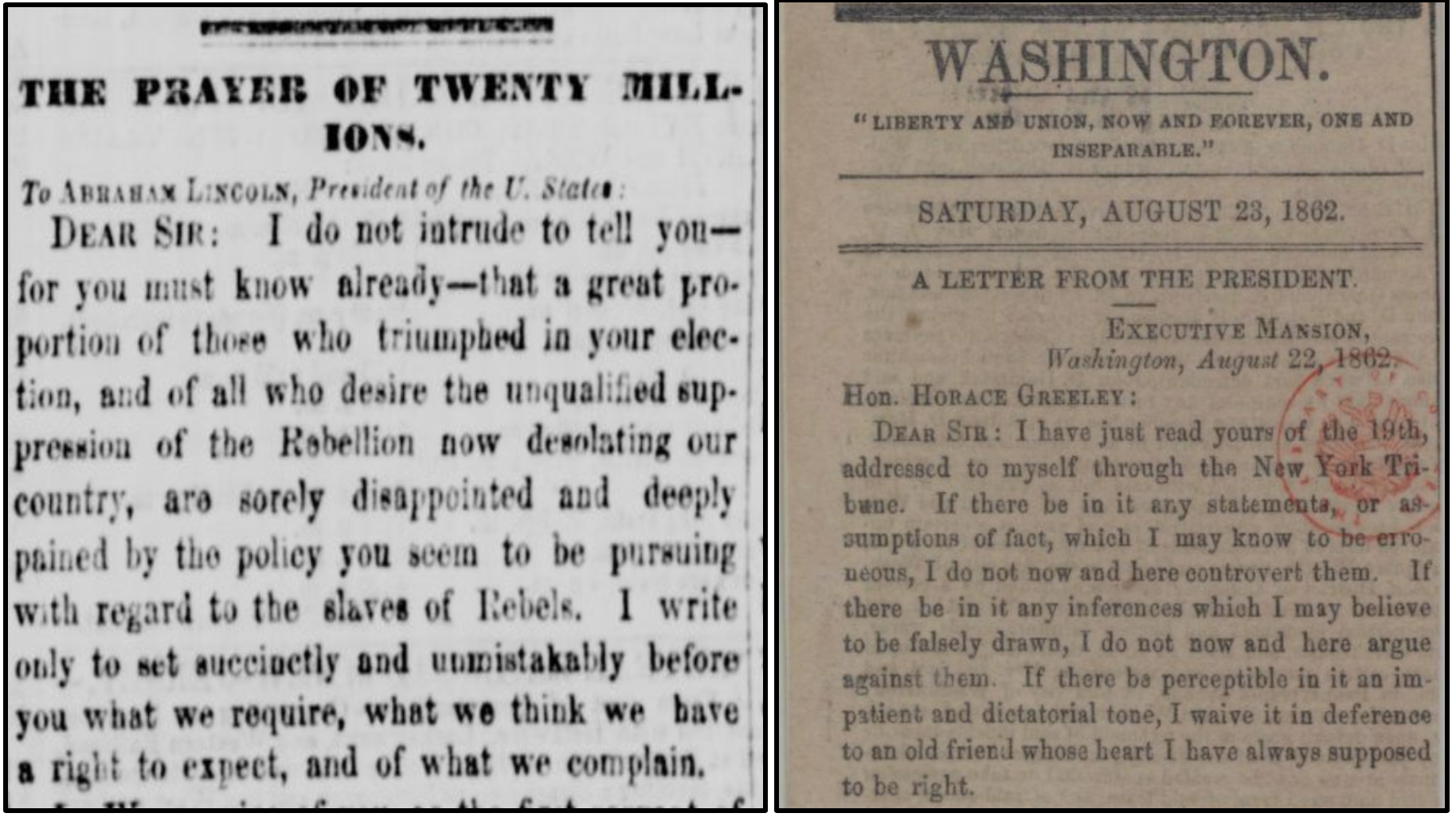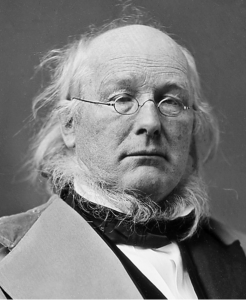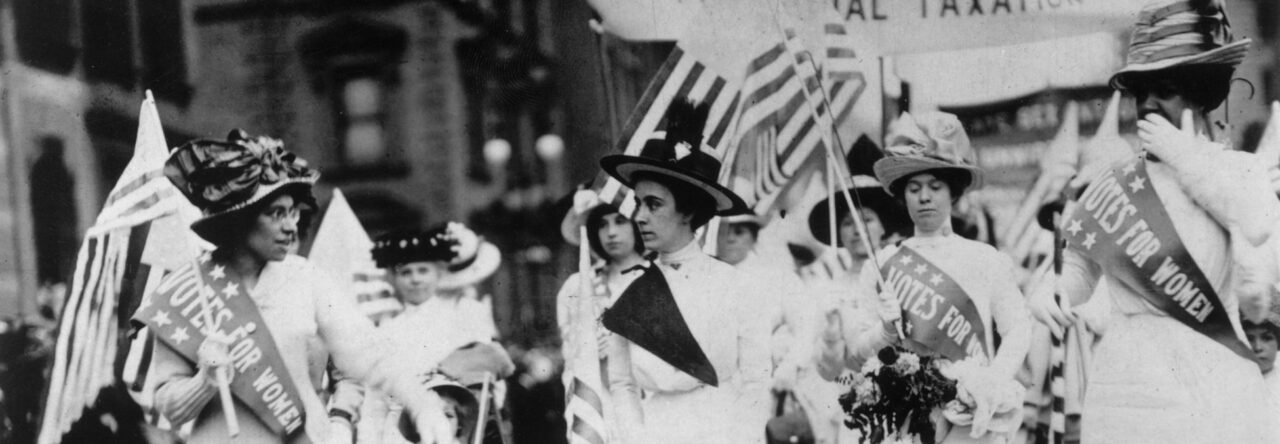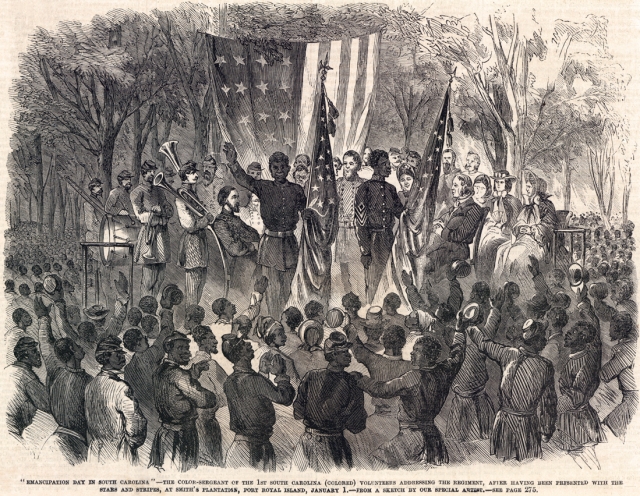[Lincoln] wanted people to read the forthcoming proclamation as a conservative gesture, the latest move in a policy whose primary purpose remained the reestablishment of the Union. That was precisely how Frederick Douglass read it: as evidence that Lincoln cared a great deal about the restoration of the Union and very little about the abolition of slavery. –Oakes, p. 189
Close Reading: Lincoln to Greeley (August 22, 1862)

Dueling public letters between the New York Tribune’s Horace Greeley (left) and President Lincoln via the Washington National Intelligencer (right)
On August 20, 1862, Horace Greeley, editor of the New York Tribune, published a scathing open letter to Abraham Lincoln, entitled, “The Prayer of Twenty Millions.” Here is an excerpt:
I do not intrude to tell you–for you must know already–that a great proportion of those who triumphed in your election, and of all who desire the unqualified suppression of the Rebellion now desolating our country, are sorely disappointed and deeply pained by the policy you seem to be pursuing with regard to the slaves of the Rebels. I write only to set succinctly and unmistakably before you what we require, what we think we have a right to expect, and of what we complain. We think you are strangely and disastrously remiss in the discharge of your official and imperative duty with regard to the emancipating provisions of the new Confiscation Act….Why these traitors should be treated with tenderness by you, to the prejudice of the dearest rights of loyal men, We cannot conceive.
Lincoln’s response, dated August 22, 1862, appeared in the Washington Daily National Intelligencer on the following day. The transcript below (with spelling errors and corrections) derives from his handwritten original.
Executive Mansion,
Washington, August 22, 1862.
Hon. Horace Greely [sic]:
Dear Sir–

Horace Greeley (1811-1872)
I have just read yours of the 19th. addressed to myself through the New-York Tribune. If there be in it any statements, or assumptions of fact, which I may know to be erroneous, I do not, now and here, controvert them. If there be in it any inferences which I may believe to be falsely drawn, I do not now and here, argue against them. If there be perceptable in it an impatient and dictatorial tone, I waive it in deference to an old friend, whose heart I have always supposed to be right. As to the policy I “seem to be pursuing” as you say, I have not meant to leave any one in doubt.
I would save the Union. I would save it the shortest way under the Constitution. The sooner the national authority can be restored; the nearer the Union will be “the Union as it was.” Broken eggs can never be mended, and the longer the breaking proceeds the more will be broken. If there be any those who would not save the Union, unless they could at the same time save slavery, I do not agree with them. If there be any those who would not save the Union unless they could at the same time destroy slavery, I do not agree with them. My paramount object in this struggle is to save the Union, and is not either to save or to destroy slavery [emphasis added]. If I could save the Union without freeing any slave I would do it, and if I could save it by freeing all the slaves I would do it; and if I could save it by freeing some and leaving others alone I would also do that. What I do about slavery, and the colored race, I do because I believe it helps to save the Union; and what I forbear, I forbear because I do not believe it would help to save the Union. I shall do less whenever I shall believe what I am doing hurts the cause, and I shall do more whenever I shall believe doing more will help the cause. I shall try to correct errors when shown to be errors; and I shall adopt new views so fast as they shall appear to be true views.
I have here stated my purpose according to my view of official duty; and I intend no modification of my oft-expressed personal wish that all men every where could be free.
Yours, A. LINCOLN
Timeline
- May 23, 1861 // Enslaved men Frank Baker, Shepard Mallory and James Townsend run away and present themselves to Union Gen. Benjamin Butler at Fort Monroe, VA. Butler refuses to return these “contrabands.”
- August 6, 1861 // Congress passes first Confiscation Act
- August 30, 1861 // Union Gen. John Fremont declares emancipation and martial law in Missouri but President Lincoln rescinds the emancipation edict
- July 8, 1862 // At his headquarters on Harrison’s Landing in Virginia, Gen. McClellan reads private letter to President Lincoln on the need for a conciliatory war following the bloody stalemate after the Peninsula Campaign
- July 17, 1862 // Congress passes Militia Act and second Confiscation Act, and Lincoln signs into law, despite some concerns about constitutionality
- July 22, 1862 // Lincoln reads first draft of Emancipation Proclamation to cabinet but keeps document secret
- August 22, 1862 // Lincoln rebukes Horace Greeley and explains his position on emancipation
- September 17, 1862 // Battle of Antietam –bloodiest day in US history
- September 22, 1862 // Lincoln announces plans for Emancipation Proclamation
- December 11-15, 1862 // Battle of Fredericksburg defeat creates crisis of confidence in Union
- January 1, 1863 // Lincoln issues Emancipation Proclamation
Emancipation Day
The scene at Beaufort, South Carolina on Emancipation Day (January 1, 1863), offers perhaps the best snapshot of emancipation’s complexities and its achievements.
Sergeant Prince Rivers receives the colors of the First South Carolina Volunteers, Port Royal, South Carolina, January 1, 1863 (Courtesy of the House Divided Project)
This scene in Port Royal, South Carolina is very revealing at several levels, but as a study of the end of the war, it offers a poignant window into the revealing saga of Prince Rivers, a man who arguably is the most teachable figure from the Civil War & Reconstruction era.
Prince Rivers (c. 1820 – 1887)
“Dat’s de reason I jine de soldier. I was gettin’ big wages in Beaufort, but I’d rather take less, and fight for de United States; for I believe the United States is now fightin’ for me, and for my people.” Prince Rivers quoted by James Miller McKim, August 1862


